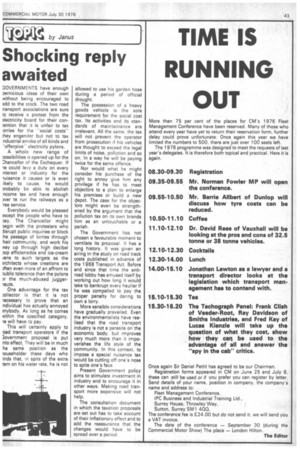Shocking reply awaited
Page 45

If you've noticed an error in this article please click here to report it so we can fix it.
30VERNMENTS have enough pernicious ideas of their own Nithout being encouraged to add to the stock. The two road ransport associations are sure o receive a protest from the alectricity board for their con:ention that it is unfair to tax orries for the "'social costs" hey engender but not to tax ndustrial smoke of all kinds and "offeRsiveelectricity pylons.
A whole new range of possibilities is opened up for the :hancellor of the Exchequer. If le could levy a duty on every nterest or industry for the nuisance it causes or is even ikely to cause, he would Probably be able to abolish ncome tax and have enough pver to run the railways as a 'roe service.
Everybody would be pleased 3xcept the people who have to Day. The Chancellor might pegin with the protesters who iisrupt public inquiries or block he passage of lorries through heir community, and work his Nay up through high decibel pop afficionados and ice-cream /ens to such targets as the irchitects whose creations are Pften even more of an affront to Public tolerance than the pylons Pr the much-abused juggernauts.
One advantage for the tax :ollector is that it is not necessary to prove that an ndividual has actually annoyed inybody. As long as he comes vithin the specified category, ne will have to pay.
This will certainly apply to 'oad transport operators if the 3overnment proposal is put nto effect. They will be in much he same position as the touseholder these days who inds that, in spite of the extra. tern on his water rate, he is not allowed to use his garden hose during a period of official drought.
The possession of a heavy goods vehicle is the sole requirement for the social cost tax. Its activities and its standards of maintainance are irrelevant. All the same, the tax will not prevent the operator from prosecution if his vehicles are thought to exceed the legal limits of noise, pollution and so on. In a way he will be paying twice for the same offence.
Nor would what he might consider his purchase of the right to annoy give him any privilege if he has to meet objectors to a plan to enlarge his premises or build a new depot. The case for the objectors might even be strengthened by the argument that the pollution tax on its own brands him as an untouchable or a pariah.
The Government has not chosen a favourable moment to ventilate its proposal. It has a long history. It was given an airing in the study on road track costs published in advance of the 1968 Transport Act. Before and since that time the antiroad lobby has amused itself by working out how long it would take to bankrupt every haulier if he was compelled to pay the proper penalty for daring to own a lorry.
More sensible considerations have gradually prevailed. Even the environmentalists have realised that the road transport industry is not a parasite on the economic body, but improves very much more than it impoverishes the life style of the community. In this context. to impose a special nuisance tax 'would be cutting off one's nose to spite one's face.
Present Government policy aims to stimulate investment in industry and to encourage it in other ways. Making road transport more expensive will not help.
The consultation document in which the taxation proposals are set out has to take account of their inflationary effect and to add the reassurance that the changes would have to be spread over a period.




















































































